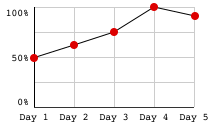Technological Change: the development of new goods, and better ways of producing goods and services.
Capital Accumulation: the growth of capital resources. This includes human capital as well.
Note 1: For economic growth such as technological change or capital accumulation to happen, we must spend resources on that. By spending resources on research and development to produce these, we will have to decrease our production of consumption goods and services. In other words, the opportunity cost of economic growth is less current consumption.
Note 2: An advantage of economic growth is increased consumption in the future.






